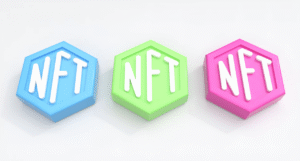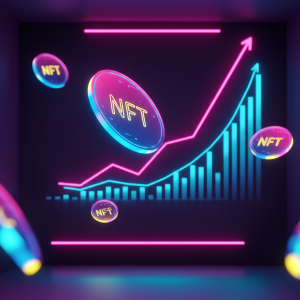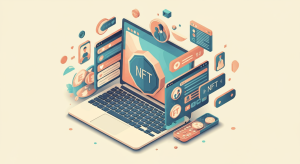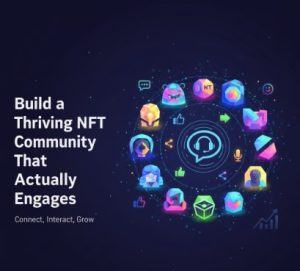How to Make Money with NFTs: Strategies for Digital Asset Monetization

The NFT market has created diverse income opportunities for creators, investors, and entrepreneurs. While headlines often focus on multi-million dollar sales, the market encompasses various approaches to generating revenue that don’t require celebrity status or massive capital. This guide explores realistic strategies for making money with NFTs across the ecosystem.
Creating and Selling Original NFTs
The most direct path to NFT monetization begins with creating original digital assets. Artists, musicians, writers, and designers can transform their work into NFTs that establish verifiable ownership and scarcity. The value proposition extends beyond the artwork itself—it includes authenticity verification, direct creator support, and potential utility within digital ecosystems.
Successful creators typically develop distinctive styles that stand out in a crowded marketplace. Building a recognizable brand identity helps collectors identify and value your work. Many profitable creators release consistent series or collections rather than isolated pieces, allowing collectors to invest in an evolving creative vision.
Royalty mechanisms represent perhaps the most revolutionary aspect of NFT creation. Unlike traditional art sales where creators receive payment only once, NFT smart contracts can automatically allocate a percentage (typically 5-15%) of secondary sales back to the original creator. This creates potential for significant passive income as pieces change hands over time, particularly for works that appreciate in value.
Strategic NFT Trading
Active trading represents another monetization approach, requiring market knowledge and timing rather than creative skills. Experienced traders identify promising projects early, purchasing during initial releases or when prices temporarily dip. They then sell when market interest or project developments drive valuations higher.
Effective trading requires thorough research into project fundamentals. This includes examining the team’s background and track record, understanding the project’s roadmap and utility proposition, and evaluating community strength and engagement levels. Projects with active development, transparent leadership, and growing user bases often outperform those relying solely on hype.
Market timing significantly impacts trading success. Trading volumes typically spike around project launches, major announcements, or prominent sales within collections. Monitoring social media sentiment, Discord activity, and transaction patterns helps identify potential price movement catalysts. Successful traders develop resistance to FOMO (fear of missing out) and instead focus on value identification against market trends.
Developing NFT-Based Businesses
Entrepreneurial opportunities extend beyond creation and trading. Some developers build tools and services supporting the NFT ecosystem—from specialized marketplaces to analytics platforms. These businesses generate revenue through transaction fees, subscription services, or premium features while contributing valuable infrastructure to the space.
NFT-based gaming presents another substantial opportunity. Game developers integrate NFTs as ownable characters, items, or land parcels that players can purchase, earn, trade, and sometimes monetize through gameplay. Successful projects like Axie Infinity demonstrated how play-to-earn mechanics can create entire economic ecosystems where players generate income through skilled play.
Virtual real estate development has emerged as a specialized niche. In metaverse platforms like Decentraland and The Sandbox, entrepreneurs purchase land parcels and develop experiences, venues, or advertising spaces that generate rental income or visitor-based revenue. These digital property developers often create galleries, event spaces, or interactive experiences that attract users and create monetization opportunities.
Providing NFT-Related Services
As the market matures, demand for specialized services continues growing. Marketers help creators promote upcoming releases, developing strategic campaigns that build anticipation and community engagement. Artists with technical expertise offer minting services to traditional creators looking to enter the space. Market analysts provide insight reports to investors making allocation decisions.
Curation represents another valuable service in the increasingly crowded marketplace. By developing respected taste and judgment, curators help collectors navigate overwhelming options to identify meaningful investments. This expertise can be monetized through consultation fees, affiliate partnerships with marketplaces, or developing curated collections that receive commissions on sales. For detailed guides and market analysis that can help with your NFT journey, visit NFT Marketo, where we provide resources for creators, investors, and entrepreneurs alike.
Community management has become essential for successful projects, creating opportunities for those with strong communication and organization skills. Managing Discord servers, moderating discussions, organizing events, and facilitating collaboration between creators and collectors provides vital infrastructure that projects will pay to maintain.
Long-Term Investment Approaches
Some participants approach NFTs as long-term investments rather than trading vehicles. This strategy involves identifying projects with sustainable visions and holding through market fluctuations. These investors often focus on historically significant collections, artists with established trajectories, or projects with genuine utility and adoption potential.
Diversification proves essential for resilient investment strategies. Rather than allocating capital to a single project or category, successful investors often spread holdings across art, collectibles, gaming assets, and infrastructure tokens. This approach hedges against sector-specific downturns while maintaining exposure to growth opportunities.
The most sustainable investment approaches combine financial considerations with genuine interest in the space’s development. Collectors who understand the cultural and technological significance of their holdings often make better decisions than those focused solely on potential returns. This authentic engagement provides context for valuation and helps identify meaningful projects amid market noise.
Navigating Challenges and Risks
All NFT monetization strategies require acknowledging significant risks. Market volatility can rapidly erode valuations, particularly for projects without substantive fundamentals. Regulatory uncertainty remains a concern, as frameworks for digital assets continue evolving globally. Technical vulnerabilities like smart contract flaws or storage failures pose long-term preservation risks.
Success typically requires patient community building rather than seeking overnight results. Most profitable creators and projects develop reputations through consistent quality and engagement over months or years. The rapid wealth stories often highlighted in media represent outliers rather than typical experiences.
The most sustainable approaches to NFT monetization combine technological understanding with authentic contribution to the ecosystem. Whether creating, trading, building, or providing services, participants who deliver genuine value tend to establish longevity beyond market cycles. For a deeper understanding of the blockchain technology that powers NFTs, Blockchain Council’s NFT resource center provides educational content for all skill levels.








